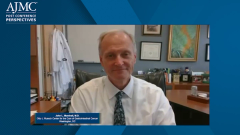
Innovations Needed in GI Cancer and Key Takeaways from ESMO 2023
John L. Marshall M.D., explains the importance of in-person conferences and the future of AI in the field.
Episodes in this series

John L. Marshall, MD: The sad thing about what we need to do next is we don’t even know what we’re doing now. We don’t know how these drugs really work. We can tell a story as to why PD-1 drugs work, right? That we somehow reshow the immune system the cancer, and say, “OK, go get it.” And if the immune system is there and charged and ready to go, it’ll go get it. So that we can sort of talk it through, and we can show that that may be happening. VEGF [vascular endothelial growth factor] inhibitors, for example, we’ve been saying they’re antiangiogenic, we’ve been saying they’re antimetastatic drugs and enhance the access to chemotherapies, etc. But there’s also some pretty good evidence that it may be an immunotherapy medicine and that VEGF itself may be, in fact, inhibiting dendritic cell function or antigen presentation. By inhibiting VEGF, we might be waking the immune system up, but we don’t know, really. We can show biology that suggests this, but that doesn’t mean that’s what’s actually in play in the human. So, we are still kind of flying blind. We’re telling a story that fits our observations instead of really knowing what’s going on. And then I mentioned before, and I think [it] can’t be mentioned enough, in medical school I think I spent 1 hour of 4 years of medical school learning about our microbiome, the bacteria in our mouths and our GI [gastrointestinal] tracts, etc, and then promptly passed the test and forgot what I learned. It’s such an important part of us. There’s more bacterial DNA in front of you on this camera than there is human DNA. And yet we’re not measuring it. We’re not studying it. In colon cancer, for example, we know that bacterial DNA goes along with the metastases to the liver. There’s some evidence that suggests that the bacteria, the microbiome, may precede the metastasis, if you will, building a little nest for the cancer cell to land in and happily grow.We’re just beginning to understand the role that the microbiome probably is playing. There’s lots of evidence here. The microbiome affects our immune system. We want a nice, complex, rich microbiome. Think of soil in your garden. You want a nice, rich mix of things in that soil for the best plant growth. The same is true for our GI tracts. So once we start to understand our own soil, I think we’ll understand what our diets are doing. I think we’ll understand how to best optimize our immune systems. So, this science that we’re seeing, I believe, will be another major breakthrough. Think [of it as a] computer chip breakthrough in our understanding of our health, not just in cancer, but in all sorts of immunotherapy kinds of immunologic diseases, etc. So I’m excited. I hope I live long enough to see it.
We are already doing a lot of genetic testing on our patients in the colon and others. We’re doing huge genetic profiles. And I know we’re all a little freaked out by AI [artificial intelligence] right now, but I do think that AI reading and learning and picking out the patterns in these terabytes of data that we have on our patients will, in fact, make us all better doctors. Less trial and error, more guidance from our genomics as well as our just data and experience. So, I am optimistic that that field of information science will, in fact, also help improve our outcomes for colon cancer patients.
Getting together to meet is important. One of the things we learned from the pandemic is that we did not learn as much when we weren’t physically together. So getting back together, meeting in Barcelona. Great place to meet, by the way. We learn a lot much faster as we collaborate and communicate in real-time. I have to restress to all of us, those of us who are trying to put together the pieces of this puzzle, that it is important that we show up. It is important that we’re in the room, and it is important that we discuss results. Whether it’s over a picture of margaritas or sangria, in this case, or it’s over a coffee in the morning, that kind of communication and collaboration is invaluable. So, come out, join the meetings, share your thoughts, learn, and teach. We’ll be better doctors because of it.
Transcript edited for clarity.
Newsletter
Stay ahead of policy, cost, and value—subscribe to AJMC for expert insights at the intersection of clinical care and health economics.










